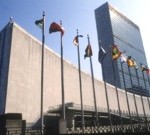 CONCLUDING EIGHTH SESSION, UN FORUM ON FORESTS CALLS FOR URGENT COORDINATED ACTION
CONCLUDING EIGHTH SESSION, UN FORUM ON FORESTS CALLS FOR URGENT COORDINATED ACTION
TO COMBAT BIODIVERSITY LOSS, OTHER LOOMING ENVIRONMENTAL THREATS
All 192 Member States of the United Nations agreed on the need for intensified global action to protect the world’s forests from a series of environmental threats, including climate change, loss of biodiversity and desertification, as the United Nations Forum on Forests concluded its biennial meeting this weekend on the brink of the upcoming climate change negotiations in Copenhagen, which will focus for the first time on a substantial approach to addressing forests and climate change.
The Forum called for strengthened unprecedented levels of coordination and enhanced cooperation to bring sustainable forest management strategies into relevant programmes and processes, such as those on climate change, biodiversity and water resources management. The Forum also called upon countries to undertake national forest inventories and to use market-based approaches to the production and consumption of products from sustainably managed forests.
Every year, about 13 million hectares of the world’s forests are lost due to deforestation according to the United Nations Food and Agriculture Organization. Forests are home to at least 80 per cent of all terrestrial biodiversity, and some estimates indicate that deforestation in closed tropical rainforests could account for the loss of as many as 100 species a day.
The carbon in forests exceeds the amount of carbon currently in the atmosphere. Forest ecosystems contained 638 billion tons (Gt) of carbon in 2005, with half (321 Gt) found in forest biomass and deadwood. Deforestation accounts for 35 per cent of carbon emissions in developing countries and 65 per cent in least developed countries. In 2004, the forest sector accounted for the release of approximately 8.5 Gt of carbon dioxide, mostly from deforestation, which contributes 17.4 per cent of all human-generated emissions.
Trade in forest products had an estimated value of $327 billion in 2004, representing 3.7 per cent of global trade in all commodity products. More than 1.6 billion people depend on forests for subsistence, livelihood, income and employment, according to World Bank estimates.
Sha Zukang, Under-Secretary General for Economic and Social Affairs, emphasized that sustainable management of the world’s forests was a critical factor in developing integrated solutions to the numerous current global crises -- financial, economic, environmental and social. “Forests need resources now, and investing in forests will generate dividends of sustainable, inclusive and green growth for decades to come.”
While the development of climate-change-related financing mechanisms for reducing emissions from deforestation and forest degradation have captured considerable attention and resources, Jan McAlpine, Director of the United Nations Forum on Forests Secretariat, pointed out that they were unlikely to address the full scope of sustainable forest management. For that reason, improving coordination and cooperation was essential to advance a mutually supportive agenda for climate change and sustainable forest management.
She pointed out that the Forum brought a 360-degree perspective on all types of forests around the world, focusing on everything from complete protection on one hand to sustainable use of forest products on the other, with climate, biodiversity and people within the scope of that global perspective. “Intersectoral and coordinated approaches are the next frontier for understanding how to advance sustainability. We must change the way we work together.”
Delegations also engaged in lengthy negotiations on how to address financing for sustainable forest management, but agreement could not be reached, and the draft text was forwarded for consideration by the Forum’s next session in January 2011.
The theme for the ninth session (24 January to 4 February 2011) will be “Forests for people, livelihoods and poverty eradication”, encompassing issues of community-based forest management; social development and indigenous and other local and forest-dependent communities, including forest land tenure; and social and cultural aspects.
For more information or interviews, please contact Dan Shepard, United Nations Department of Public Information, tel.: +1 212 963 9495 or +1 212 963 6816, fax: +1 212 963 1186, e-mail: This email address is being protected from spambots. You need JavaScript enabled to view it.; or Mita Sen, United Nations Forum on Forests Secretariat, tel.: +1 917 367 5069, fax: +1 917 367 3186, e-mail: This email address is being protected from spambots. You need JavaScript enabled to view it..



